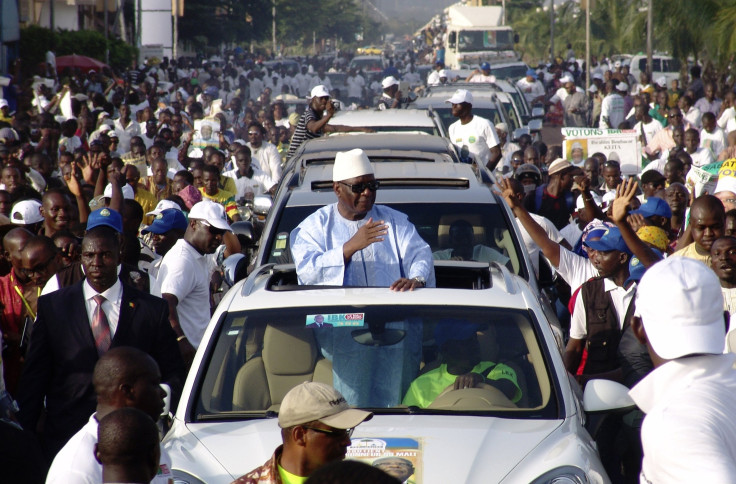Ibrahim Boubacar Keita Sitting Pretty As Mali Awaits Official Presidential Election Results

It's not official yet, but early voting results indicate that Ibrahim Boubacar Keita, widely known as IBK, could very well become the next president of the West African country of Mali. The election was peaceful; about 3.6 million citizens -- 53.5 percent of all eligible voters, a record turnout for the country -- cast their ballots for one of the 27 eligible candidates. Two have emerged as clear front-runners, with Keita reportedly in the lead so far, and Soumaila Cisse, a former finance minister, in second place.
A runoff will take place on Aug. 11 if no candidate wins 50 percent of the vote. Early statements from electoral officials suggested that Keita's lead might be wide enough to preclude a second round of voting, though the Cisse campaign has denounced those reports.
This is a pivotal election for Mali, which suffered a military coup in March 2012 amid a months-long insurgency that saw ethnic Tuaregs and then militant Islamists take control of the sparsely populated north. France intervened in January this year, reclaiming major towns with help from a coalition of regional African armies. Instability remains, especially in northern towns such as Kidal, and the next president will have to contend with some serious challenges. Promoting unity will be first and foremost in a country where turmoil only recently interrupted decades of political stability. One of Keita's main talking points during his campaign was the restoration of Mali's "honor" -- a response to the perceived embarrassment of relying on European troops to quash the insurgency.
Keita is soft spoken and bespectacled, with a potbelly filling out the long traditional tunic -- called a boubou -- which he tends to wear while on domestic soil. But his own campaign posters call him "A Strong Man," which has worrisome connotations on a continent where autocracy is a common problem.
Keita has indeed been a bold, and sometimes uncompromising, politician. He once presided over Mali's Alliance for Democracy party, of which current interim President Dioncounda Traore is a member, and rose to prominence in 1994 when fellow party member and then-president Alpha Oumar Konare appointed him prime minister. But political clashes led him to break from the party and resign his prime ministerial post in 2000. He founded his own party, Rally for Mali, in 2001. Keita ran for president twice in -- 2002 and 2007 -- losing both elections though he garnered significant support each time.
Politically, Keita is a bit of an enigma. He's avowedly secular, but enjoys support from the High Islamic Council of Mali. He also has a diverse group of military leaders on his side, including some who participated in the March 2012 coup and others who opposed it.
Keita's electoral viability is bolstered by a strong background in economic development. After studying history, political science and international relations at schools in Mali, Senegal and Paris, he served as a Mali consultant for the European Development Fund and then went on to work for the children's NGO Terre des Hommes, according to the biographical directory African Success.
In an interview with Agence France-Presse, Keita noted that the election of a president -- no matter whom -- would be a significant achievement for Mali after two years of turmoil. After all, international donors have pledged about $4.3 billion in development aid for the country, but only if it can establish a permanent, fairly elected government.
"I think we are in a [crucial] situation," Keita said. "People say all over the world -- voices more legitimate than mine -- that we must get out of the transition. We need a legitimate base. Some great nations, friends, have been waiting for months to help." Once the election process is over, numerous challenges await the new government. Insurgent violence remains a threat in the north, as do ethnic divisions, massive displacement and endemic poverty. If Keita wins this pivotal election, it will be only his first milestone on a long road of myriad obstacles.
© Copyright IBTimes 2025. All rights reserved.





















